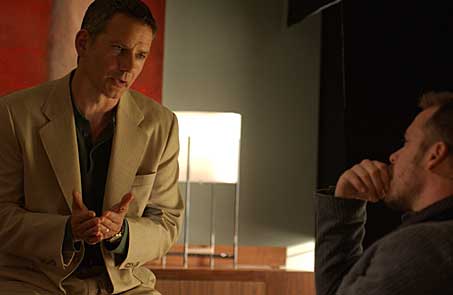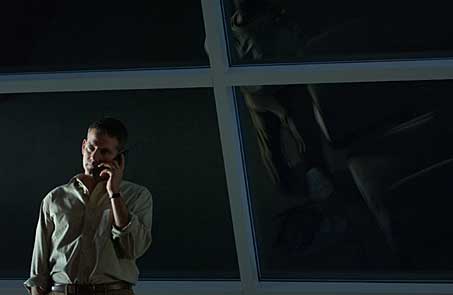
 |
||||||
|
GAY
FILM REVIEWS BY MICHAEL D. KLEMM
|
||||||
|
The Dying Gaul Sony Pictures, 2005 Screenplay/Director: Starring: Patricia Clarkson, Campbell Scott, Peter Sarsgaard Rated R, 96 minutes
|
Malcom
in the Chatroom
I've noticed an odd trend while reading DVD reviews online. Many reviewers automatically dismiss a film when they discover it's based on a play. The usual complaints are "not enough action" and "too talky." Well, I suppose it depends on who is doing the talking - Sir Ian McKellen could make the phone book sound like Shakespeare. Over the years, I have seen many great plays adapted brilliantly to the screen (Peter Shaffer's Amadeus springs immediately to mind) while others (Equus, by the same playwright) have been disastrous. Playwright Craig Lucas is the author of Longtime Companion, Reckless and Prelude to a Kiss, and I had high hopes for the film version of his acclaimed play, The Dying Gaul. My first viewing came with much baggage. I read the published play years ago and then saw it performed onstage locally by Buffalo United Artists. I was impressed by the cast that Lucas had assembled, and I was thrilled that he had adapted the screenplay himself, but I was a bit skeptical as to whether he should be directing it too. Not every stage director to cross over into film is another Orson Welles; many do not comprehend the language of cinema. Lucas' attempt to film his play is not entirely successful, but it is a very interesting mixed bag.
Robert refuses. His work is too important, too personal. He owes it to Malcom and will not compromise his principles. But, like Faust, he soon makes a deal with the devil. Not only does he rewrite the script, he also lets himself be seduced by Jeffrey. Though Jeffrey is married, happily, with two children - he sometimes needs "distractions." Here, the story shifts to examine the triangle between Robert, Jeffrey and his wife, Elaine (Patricia Clarkson). The middle third morphs into a revenge scenario worthy of grand opera. |
 |
|
| The opening scenes skewer the mentality of Hollywood moviemaking with wit and bite. (Robert: "People went to see Philadelphia." Jeffrey: "Philadelphia was about a man who hates gay people. And it's been done.") Jeffrey knows a good script when he sees it, but he also knows that audiences won't go to the movies to watch two men in bed. [Reviewer's note 2008: This film took place in the mid 1990s.] Meanwhile Elaine, a screenwriter herself who writes the kind of movies "that Jeffrey wonÕt make," asks to read the script before it gets gutted. She is moved by it and for a moment it almost seems like Elaine is falling for Robert too. A drunken discussion revolving around Robert's online chatroom habits leads to Elaine assuming a fake screenname and finding Robert online. While chatting with him, she discovers that he is getting horizontal with her husband and - you know the old saying - hell hath no fury... | |
|
Earlier, Robert refered to a chatroom in Buddhist terms as life after death, "There's all these voices, you know... these... disembodied... souls..." This theme was one of the play's masterstrokes. That Elaine could trick him so easily online is believable because of the depths of his guilt. (There is more to Malcom's death that I will leave for the viewer to discover.) She plays him like a maestro would her instrument. As powerful as these scenes are, the buildup to them includes the first of several mis-steps. Onstage, Elaine knew that Jeffrey liked men but they had an arrangement. Her jealousy stemmed from more complicated reasons. But her character has been simplified, and subsequently dumbed down, for the screen when she innocently discovers the affair while online. Surely the wife of such a powerful Hollywood mogul couldn't be so clueless. Perhaps it is more "dramatic" this way but it doesn't ring true. It is almost as if Lucas had his own producer named Jeffrey demanding changes for a bigger audience. After all, betrayed women have traditionally played well on the silver screen. |
|
 |
|
|
Most agree that people sitting at computers usually makes for boring cinema but that curse does not apply here. Look at how dramatic the cutting is when Robert, with one keystroke, replaces the name Maurice with Maggie throughout his script. The drama is opened up and filmed in such a way that a virgin audience would never even know that this had once been a play. The film looks stunning. The cinematography has a very European feel and the minimalist score is largely effective. For the most part, the stage magic translated into cinema, and not filmed theatre.
But, all flaws aside, The Dying Gaul should be seen - both for the uniqueness of its plot and for the brilliance of the performers. The triad of Clarkson, Scott and Sarsgaard is superb; their chemistry together, and their acting, is perfection. Their conviction almost makes you swallow the less convincing parts of the script. Where it fails as a thriller it soars as character drama. Perhaps the viciousness of Elaine's chatroom revenge was more shocking and modern when the play first premiered in 1998 but the effect is still deeply disturbing. There's a lot going on, perhaps too much, but the tale is never boring. The Dying Gaul hits a nerve, and you might never enter an internet chatroom ever again.
More
On Craig Lucas, Campbell Scott: Patricia
Clarkson also appears in: |